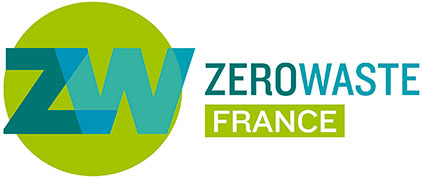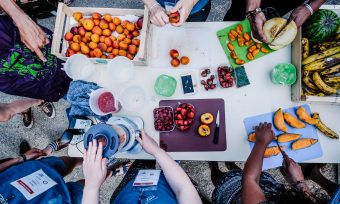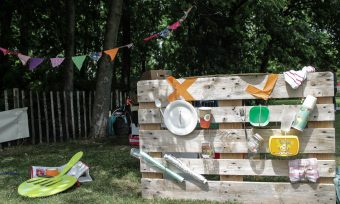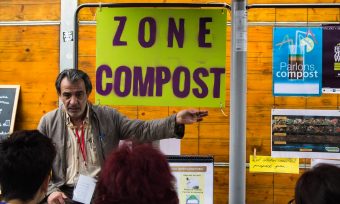Zero Waste Events
Zero Waste France has created several tools to help event organisers reduce waste production and food waste during their events.
The events industry, a huge waste-producing sector
Organising an event, and thus gathering participants, material and energy in the same place and for a short period of time, can affect the environment and natural resources. According to Ademe, the French Agency for the Environment and Energy Management, an average event of 5,000 people generates 2.5 tonnes of waste, uses 1,000 kWh of energy and 500 kg of paper (source: guide des éco-manifestations en Poitou-Charentes (French)).
The carpet – a widely used material in the event industry – is a very good example: in France, 4 million m² of carpet is used per year for conventions, fairs, forums… The organisation of a convention can thus lead to the production of 14 kg of waste per participant, and the organisation of an international seminar up to 34 kg per guest.
An event is temporary, which means that disposable products often seem essential at first sight: dishes and cups, packaged single-doses, decoration, goodies… However, it is possible to rethink the use of these single-use products in advance, and to replace them with reusable alternatives.
What is a zero waste event?
A “zero waste” event is an event that integrates the reduction of waste production and limits the use of raw materials, through several levers of action:
- Reduce upstream the production of waste created by the event: removing unnecessary products (flyers, goodies, which can be replaced by more permanent displays and intangible gifts…), encouraging purchases in large volumes (and even bulk purchases), removing single doses, reusing materials rather than buying them new, to borrow or share furniture or crockery… For example, for the Festival Zero Waste, the team recovered materials from other Parisian events (wooden panels, cardboard…) for its signs. They were then transformed by hand by the volunteer team.
- Plan waste management and recovery: anticipating on-site waste collection (signage, communication, large and sufficient bins) and waste recovery (sorting of bio-waste and recyclable waste) after the event is a key step, especially when the site is not necessarily designed to accommodate such a large number of people. It may also be useful to plan a volunteer waste management team, whose role will be to collect waste, correct sorting errors, and raise participants’ awareness about this aspect of the event.
- Communicate with the entire organising team and service providers: for the approach to be relevant, it is necessary to inform all stakeholders: sponsor, suppliers, service providers, participants, etc. Before the event, it is important to set up tools to ensure compliance with the approach (precise specifications for service providers, etc.), and to set clear waste reduction objectives.
- Raise awareness among participants: everything must be done for the participants to understand the approach, before (during registration, communication, etc.) and during the event: visibility of sorting points, display, raising awareness about waste reduction… During the Festival Zero Waste, for example, backstage visits were organised to show all the solutions that had been put in place (and not always visible by participants) to reduce waste at the event.
Resources and practical tools
Zero Waste France has developed several practical tools to support event organisers in the concrete application of a waste reduction approach:
To read:
- Self-assessment grid, carried out by Zero Waste France: which zero waste criteria can be applied to your event, and which solutions should be implemented? Use this self-assessment grid to understand your room for improvement and find appropriate solutions. (Coming soon)
- Practical and methodological sheets: set up sorting points on my event, monitor the production of waste on my event, raise awareness among participants (links in French).
- The Organise your Zero Waste Fair guide (French), Zero Waste France
- Carpet report: the planet at the end of its rope (French), Zero Waste France
- Guide des éco manifestations en Poitou-Charentes (French), Ademe, 2008.
The Ouikit, a reusable dishwashing solution
Zero Waste France offers, with the support of the Maison du Zéro Déchet, the loan of event equipment on the basis of a stock constituted by OuiShare. This stock of reusable tableware is intended for citizens and event organisers. Its aims? Limit the waste of resources by sharing equipment and to develop a culture of collaboration between local organisations. Thanks to this project, more than 10,000 items (plates, cups, cutlery, etc.) are lent each year and as many disposable items are avoided.
Do you want to reproduce the same model elsewhere in France? Zero Waste France offers you a guide to build up your own stock of reusable tableware and make it available to event organisers when you are not using it:
Apply for a loan of the Ouikit (French)You want to reproduce the same model elsewhere in France? Zero Waste France offers you a guide to build up your own stock of reusable tableware and make it available to event organisers when you are not using it:
Related news
Zero Waste France is an organization that was founded in 1997 and is mostly financed by donations and the subscriptions of citizens and organizations. Your subscription enables us to act and to guarantee Zero Waste France's independence!
A donation of 30€ only consists of 10,20€ after tax deduction.
Find out more




